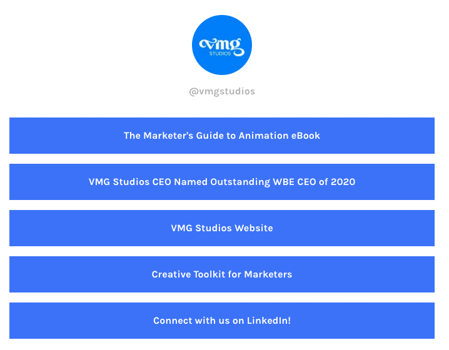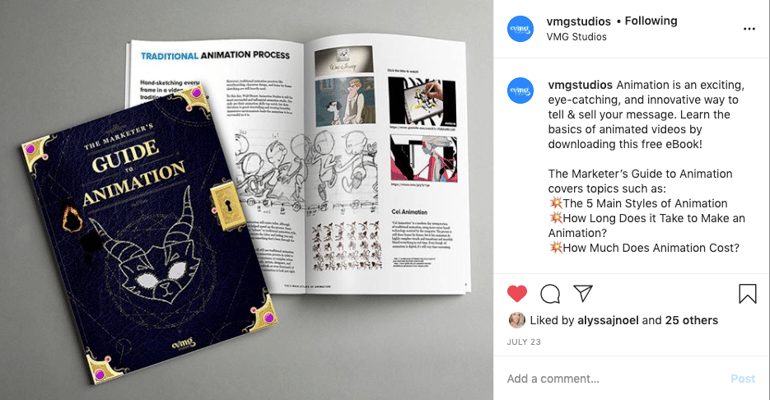As a former journalist and a current type-A personality, I find myself constantly researching. Whether it’s finding an Instant Pot recipe for dinner, a nearby trail to hit with the dog this weekend, or discovering the latest news in space travel – I love having the ability to turn to Google and find the answers to just about anything.
Naturally, when I got my current job as a content manager at VMG Studios, I did the same thing. I researched the methodology of content marketing, what it is, how it works, and the benefits of the strategy.
In my research, I realized that I was playing directly into the hands of content marketing.
I was looking at educational articles from companies who wanted my business – whether it was another marketing agency or a consultant group like our friends at IMPACT who have taught me practically everything I know.
I know I’m not alone in my quest for knowledge, especially when it comes to my economic livelihood such as how I spend my money professionally and personally.
Since your target audience is likely doing some research (more on this shortly) before making a big purchase, why not provide them with the materials to make them feel confident in picking your product or service over another.
In this article, we’re going to outline how content marketing can take your business to the next level.
What is Content Marketing?
Content marketing is a strategic inbound marketing approach focused on creating and distributing valuable, relevant, and educational content digitally to attract, retain, and qualify potential new leads.
It utilizes search engine optimization best practices so that potential customers find your business instead of the other way around.
FREE DOWNLOAD: CONTENT MARKETING 101 WORKSHEET
The benefits of producing and providing educational resources such as articles (like the one you’re reading right now), videos, infographics, and eBooks, is a two-way street: it’s helpful for the target audience in their own research and for your company’s workflow and sales pipeline.
Benefits of Content Marketing
There are several key benefits to this specific kind of marketing strategy, many of which are proving immensely valuable during this time as we shift the way we work, collaborate, and communicate.
These benefits include:
- Improved Search Engine Optimization (SEO)
- Lead generation and increased conversions
- Establishes thought leadership and expertise
- Increases brand awareness while building trust and transparency
- Develops connections with a target audience
- Grows social media channels
- Assists the sales team
Let’s break down each benefit to further explain why content marketing is the digital strategy every business, whether it’s B2B or B2C, needs.
1. Content Marketing Improves Search Engine Optimization (SEO)
Most of us likely turn to Google when we’re looking for the answer to just about anything such as the year U.S. astronauts first landed on the Moon (1969), how to pronounce Tropical Storm Isaias (ees-ah-EE-ahs), or how much the Google Pixel 4a smartphone costs ($349).
Whenever you put your search intent into Google, which link do you click on to find your answer? The advertised links up top? The featured snippet? Or just something on the first page?
If so, you’re not alone.
A survey found that 75% of users never scroll past the first page of search results. (I’m sure you see where I’m going with this.)
Since most of your target audience won’t click through to a second or third page on their search results, you’ll want your content – whether it’s your website, article, or video – to show up on that coveted first page.
While Google’s algorithm is constantly changing, there are some SEO best practices that appear to stand the test of time when it comes to securing higher search rankings. This includes posting educational, relevant, and keyword-loaded content frequently which is one of the basic principles of content marketing.
However, it’s important to note that your content won’t immediately rank number one overnight. It is a long process of building up your resources to ultimately catch Google’s attention.
Once it does work, though, it works.
VMG Studios saw a 553% increase in organic search traffic to our website in a seven-month period thanks to a steady uptick in articles and videos ranking on the first page of Google and YouTube.
2. Content Marketing Generates Leads and Drives Conversions
The goal of improving your search ranking through organic traffic is to attract and convert new clients.
If someone reads an educational article about the benefits of essential oils, they’re likely on the verge of making a purchase. If they’re reading that article on your website, where you sell organic essential oils, you’d have a greater opportunity of converting them into a customer than if they were on someone else’s website.
This is where strategically placed call to actions (CTAs) and offers can help move someone through the sales funnel.
A survey found that, on average, conversion rates are six times higher for brands using content marketing than those that aren’t.
Part of the reason those conversion rates are higher leads us to the next benefit…
3. Content Marketing Establishes Thought Leadership and Expertise
As a consumer, you want to buy the best product from the best company, for the most part, right?
Well, as a company, you can help cement your brand as the best by writing insightful content showcasing your expertise within your industry.
Instead of just listing your services on your website, by expanding upon each one with corresponding educational resources, you can illustrate your investment in your company’s offerings. It can also be refreshing for potential clients to see a dedication to education instead of simply hearing the latest sales pitch.
And if you think that people won’t read an article or watch a video regarding a specific product or service, here’s a possibly surprising statistic.
One survey found the average person consumes 11 pieces of content before making a purchasing decision.
I’ll be honest, I was even surprised to see the number 11 there. That’s a lot of content!
Ideally, you’d want all 11 pieces of that content to be produced by your company, speaking directly to your target customer, so that they can feel confident converting with your business instead of a competitor.
I’m sure you’re starting to notice a pattern here, but this leads us into the next benefit…
4. Content Marketing Increases Brand Awareness While Building Trust and Transparency
If you read 11 pieces of content from the same company, you’d be more likely to remember that company’s name – or even their logo and brand colors – later on, right?
By flooding the digital space with relevant content, you can build brand awareness which is becoming increasingly important for consumers.
One study found that 59% of consumers prefer to buy from familiar brands.
Besides being a recognizable brand for your target audience, it’s important that they also trust your company and your product/services. One way to build trust is through transparency. A study found that 94% of customers are likely to be loyal to a brand that offers complete transparency.
If you are cagey when it comes to the nitty-gritty details of your service offerings, such as price, then there’s a chance you might be deterring potential customers from choosing your company over a competitor.
5. Content Marketing Helps Develop Connections With Your Target Audience
One of the main reasons for writing educational content is to help address customer concerns and questions regarding your services. In turn, you’re establishing a connection with the reader by providing the assistance they were looking for when they turned to Google or other search engines.
Besides organic search traffic, the beauty of the content you’re creating is the ability to share it across social media.
Social media is the easiest way to engage your audience and continue to build brand awareness and trust.
One survey found that when customers feel connected to brands, 57% of consumers will increase their spending with that brand and 76% will buy from them over a competitor.
Developing these connections is a two-way street. By responding and actively engaging on social media, particularly when it comes to educational content, you’re building brand trust and loyalty with your consumers. However, it’s also an opportunity for consumers to help brainstorm topics to address with content marketing. Ask the readers to participate by offering a space for them to submit questions they’d like answered in an article and/or video. They might surprise you with a topic you hadn’t thought of before.
6. Content Marketing Builds Social Media Presence
We pretty much touched upon this, but if you are a social media manager or part of the marketing team, then you know that it can be overwhelming to back stock content to consistently post on the various platforms.
In general, it is recommended that companies post on social media daily, or at least a few times a week, on LinkedIn, Instagram, Facebook, YouTube, and Twitter. And that means you need plenty of content to do so.
The good news is that you can repurpose all of your content marketing materials, such as articles, videos, eBooks, or infographics into social media posts that drive people to your website.
Here’s an example of a social media post on VMG Studios’ Instagram account after we launched our latest eBook: The Marketer’s Guide to Animation.

We created supporting graphics to post on social media (as you can see on the left) and then linked to the content, itself, in the Linktree in VMG’s profile (the first link in the image on the right).
It’s a great way to mix in educational and valuable content in between your branded Halloween animation and employee spotlight posts.
7. Content Marketing Assists the Sales Team
Most of the benefits I’ve listed so far have really focused on the customer – how a content marketing strategy benefits them (which, in turn, benefits your company).
However, arguably, one group that benefits the most from content marketing is the sales team.
How?
Content marketing saves the sales team time.
This is quite possibly a stereotype, but in my experience, it appears that most sales teams (regardless of which industry you’re in) are constantly busy and simply don’t have enough time in a day to accomplish all their goals.
Insert content marketing.
Part of the reason why sales teams are so busy is the repetitiveness of answering frequently asked questions from a prospective buyer. Sure, the sales team may have templated emails to address such questions, but that doesn’t always get the job done or it may not be in-depth enough and warrants half a dozen more follow-up emails or phone calls.
Thanks to content marketing, you can equip the sales team with articles and videos that directly answers those questions – some of which are extremely complicated to answer (like how much a video costs, for example).
Another way that content marketing helps save time for the sales team is through lead qualification. Salespeople spend a good amount of time either qualifying or disqualifying leads based on a variety of factors, generally the biggest being budget and time.
By sending an article to a prospective client outlining the cost of something, you’re giving the customer the opportunity to self-qualify. After reading the material, the customer can then decide whether to move forward with a sales call or decide if your product/service is within their budget.
A customer can even self-qualify before they have a single interaction with a salesperson due to the content library that’s offered on your website. Remember that statistic from earlier? The average person consumes 11 pieces of content before making a purchasing decision.
One of the goals of content marketing is that people will consume material on your website to determine if you are a good fit for their needs prior to a meeting. If they don’t, you still have the opportunity to send articles and videos to them upon that first touch-point. Ultimately, it’s a win-win situation.
Why Give Content Marketing a Try
There are a lot of trends that are fleeting – ones that leave a “blink and you miss it” impact. Content marketing is not one of those things.
Since VMG Studios implemented content marketing in the fall of 2019, we’ve continued to see our organic search skyrocket (a 553% increase since January of 2020), an increase in leads, and it has proven to be essential during COVID-19 as we all pivot our strategies to remain successful.
Educating potential clients through articles and videos helps qualify leads through organic search, establishes your business as an industry thought leader, and can save your busy sales team time.
Content marketing requires dedication, and while you might not see immediate results (although that is absolutely possible), once you do see the results, you’ll wonder why you haven’t been doing this forever.
If you need help getting your content marketing efforts off the ground or simply want to learn more, VMG Studios would be happy to walk you through the basics. Be sure to download our free Content Marketing 101 Worksheet, too, to get organized.







